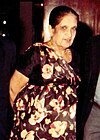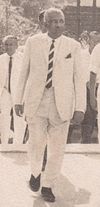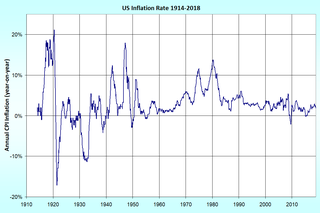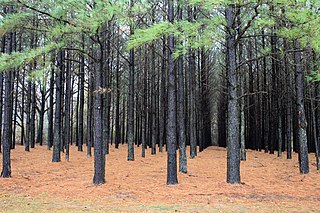
Solomon West Ridgeway Dias Bandaranaike, frequently referred to as S.W.R.D. Bandaranaike, was the fourth Prime Minister of Ceylon and founder of the Left wing and Sinhala nationalist Sri Lanka Freedom Party. SWRD Bandaranaike became the prime minister of Ceylon in 1956 and carried out left wing reforms such as nationalizing bus services and introducing legalization to prohibit caste based discrimination. Bandaranaike is also remembered for removing British naval and air bases in Sri Lanka and establishing diplomatic missions with a number of communist states.
The United People's Freedom Alliance, is a political alliance in Sri Lanka founded by former Sri Lankan president Chandrika Kumaratunga in 2004. The alliance is generally regarded as being representative of Sinhalese nationalism.
The United National Front(UNF) later the United National Front for Good Governance(UNFGG) is a political alliance in Sri Lanka formed by the United National Party, the alliance currently represents 7 parties including the largest Muslim party Sri Lanka Muslim Congress and the Sinhala Nationalist Jathika Hela Urumaya. The UNF is current governing party in the Parliament of Sri Lanka. A new UNP led alliance, the National Democratic Front (NDF) is in the process of being formed for future elections.

General elections were held in Ceylon from 23 August to 20 September 1947. It was the first election overseen and administered by the newly-formed Department of Parliamentary Elections.

Ganapathipillai Gangaser Ponnambalam was a Ceylon Tamil lawyer, politician and cabinet minister. He was the founder and leader of the All Ceylon Tamil Congress (ACTC), first political party to represent the Ceylon Tamils.

The 1977 Sri Lankan election heralded the beginning of a new period of Sri Lanka's history - a period of unprecedented violence.

General elections were held in Ceylon in March 1965.

General elections were held in Ceylon in 1956. They were a watershed in the country's political history, and was the first elections fought to challenge the ruling United National Party. The former Leader of the House, S.W.R.D. Bandaranaike who was passed over after the death of the first Prime Minister D.S. Senanayake, crossed over to the opposition to form the Sri Lanka Freedom Party to launch his bid for Prime Minister.

General elections were held in Ceylon in 1952. It is notable for being the second and final election overseen and administered by the Department of Parliamentary Elections before its merger in 1955.

General elections were held in Ceylon on 19 March 1960.

General elections were held in Ceylon in July 1960.
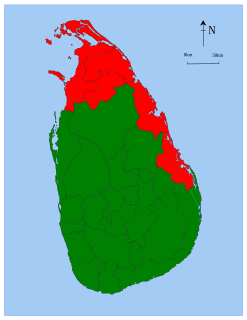
The 1982 Sri Lankan national referendum took place on December 22, 1982, giving the people of Sri Lanka the option to extend the life of parliament by 6 years. It was the first and so far only national referendum to be held in Sri Lanka. The referendum was called for by President J. R. Jayawardene, who had been elected to a fresh six-year term as President in October 1982. With the life of the current parliament due to expire in August 1983, Jayawardene faced the possibility of his ruling United National Party losing its massive supermajority in parliament if regular general elections were held. He therefore proposed a referendum to extend the life of parliament, with its constituents unchanged, thereby permitting the United National Party to maintain its two-thirds parliamentary majority.

Illankai Tamil Arasu Kachchi (ITAK) is a Sri Lankan political party which represents the Sri Lankan Tamil ethnic minority in the country. It was originally formed in 1949 as breakaway faction of the All Ceylon Tamil Congress (ACTC). In 1972 ITAK merged with the ACTC and Ceylon Workers' Congress (CWC) to form the Tamil United Front, which later changed its name to Tamil United Liberation Front. ITAK remained dormant until 2004 when a split in the TULF resulted in ITAK being re-established as an active political party. ITAK is constituent party of the Tamil National Alliance.
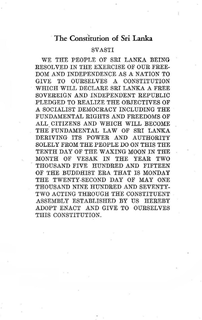
The Sri Lankan Constitution of 1972 was a constitution of Sri Lanka, replaced by the 1978 constitution currently in force. It was Sri Lanka's first republican constitution, and its second since independence in 1948. The constitution changed the country's name to Sri Lanka from Ceylon, and established it as an independent republic. The country was officially designated "Republic of Sri Lanka", leading to this constitution being known as "the 1972 Republican Constitution". The constitution was promulgated on 22 May 1972.

The 2015 Sri Lankan parliamentary election was held on 17 August 2015, ten months ahead of schedule, to elect 225 members to Sri Lanka's 15th Parliament.

Shelton Ranaraja was a Sri Lankan lawyer, politician and deputy minister.
Don Frank Hettiarachchi was a Ceylonese politician.

Jayaweera Kuruppu was a Ceylonese politician.


